
John Hanson was an American Founding Father, merchant, and politician from Maryland during the Revolutionary Era. In 1779, Hanson was elected as a delegate to the Continental Congress after serving in a variety of roles for the Patriot cause in Maryland. He signed the Articles of Confederation in 1781 after Maryland joined the other states in ratifying them. In November 1781, he was elected as the first President of the Confederation Congress, following ratification of the articles. For this reason, some of Hanson's biographers have argued that he was actually the first holder of the office of President of the United States.
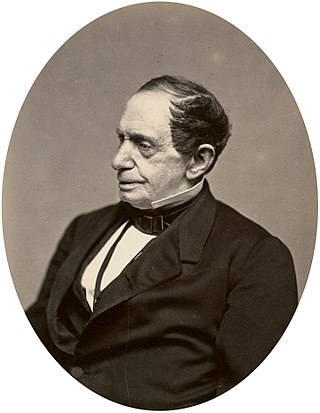
Johns Hopkins was an American merchant, investor, and philanthropist. Born on a plantation, he left his home to start a career at the age of 17, and settled in Baltimore, Maryland, where he remained for most of his life.

Luther Martin was a Founding Father of the United States, framer of the U.S. Constitution, politician, lawyer, and slave owner. Martin was a delegate from Maryland to the Constitutional Convention in 1787, but did not sign the Constitution, having left the convention early because he felt the document as proposed violated states' rights. In the months following the convention, he was a leading Anti-Federalist, along with Patrick Henry and George Mason, whose collective efforts led to the passage of the Bill of Rights.

Uriah Forrest was an American statesman and military leader from Maryland. Forrest was born in St. Mary's County in the Province of Maryland, near Leonardtown. In his early childhood, he received only limited schooling. Born into a family with three other brothers, he was the direct descendant of a person who came to Jamestown, Virginia, in 1608.
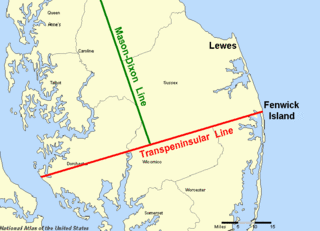
The Transpeninsular Line is a surveyed line, the eastern half of which forms the north–south border between Delaware and Maryland. The border turns roughly north from the midpoint of the line towards the Twelve-Mile Circle, which forms much of the remainder of the Delaware land border.
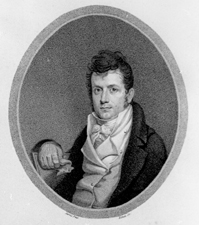
Alexander Contee Hanson was an American lawyer, publisher, and statesman. He represented the third district of Maryland in the U.S. House, and the state of Maryland in the U.S. Senate.
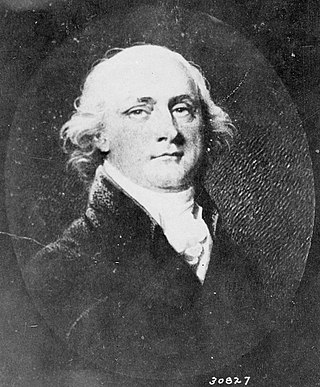
John Francis Mercer was a Founding Father of the United States, politician, lawyer, planter, and slave owner from Virginia and Maryland. An officer during the Revolutionary War, Mercer initially served in the Virginia House of Delegates and then the Maryland State Assembly. As a member of the assembly, he was appointed a delegate from Maryland to the Philadelphia Convention of 1787, where he was a framer of the U.S. Constitution though he left the convention before signing. Mercer was later elected to the U.S. House of Representatives from two different districts in Maryland. In 1801—1803, he served as Maryland's 10th governor.
William Richardson was a Maryland politician and Continental Army officer.
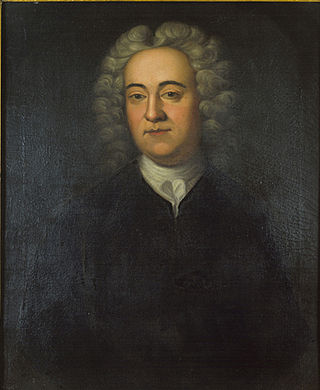
Daniel Dulany the Elder (1685–1753) was a prominent lawyer and land-developer in colonial Maryland, who held a number of colonial offices. In 1722 Dulany wrote a pamphlet entitled The Right of the Inhabitants of Maryland, to the Benefit of the English Laws, asserting the rights of Marylanders over the Proprietary Government.
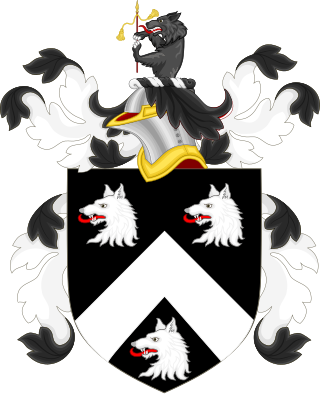
George Beall, Jr. was a wealthy landowner in Maryland and Georgetown in what is now Washington, D.C. He was the son of George Beall, Sr. (1695-1780) and Elizabeth Brooke (1699-1748), and the grandson of Col. Ninian Beall (1625-1717) and Ruth Moore (1651-1712). George Beall married Elizabeth Magruder.
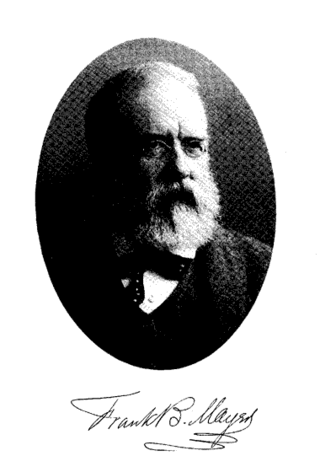
Francis Blackwell Mayer was a prominent 19th-century American genre painter from Maryland. While he spent most of his life in that state, he took a trip to the western frontier in the mid-nineteenth century and executed a series of drawings of Native Americans; he also studied in Paris for five years in the 1860s.

William Paca was a Founding Father of the United States who was a signatory to the Continental Association and the United States Declaration of Independence. He was a Maryland delegate to the First Continental Congress and the Second Continental Congress, governor of Maryland, and a district judge of the United States District Court for the District of Maryland.
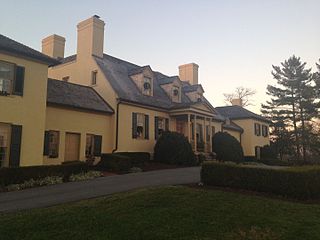
The Belmont Estate, now Belmont Manor and Historic Park, is a former plantation located at Elkridge, Howard County, Maryland, United States. Founded in the 1730s and known in the Colonial period as "Moore's Morning Choice", it was one of the earliest forced-labor farms in Howard County, Maryland. Its 1738 plantation house is one of the finest examples of Colonial Georgian architectural style in Maryland.

John Thomas Scharf was an American historian, author, journalist, antiquarian, politician, lawyer and Confederate States of America soldier and sailor. He is best known for his published historical works. Modern historians and researchers cite his comprehensive histories as primary source materials.
Maryland's colonial economic history is marked by a heavy reliance on the tobacco crop. Though it would remain a slave state until the end of the Civil War, it was not until the 1700s that labor began to drive agricultural production in the colony. The colonial-era would also see Maryland begin early industrialization and urbanization, experiment with different monetary systems, and make efforts to diversify its economy.

Alexander Contee Hanson Sr. was an attorney who served as Chancellor of Maryland from 1789 until his death.
Stephen West, Jr. (1727–1790) was a merchant, plantation owner, and public official from Maryland. During the American Revolutionary War, he manufactured and sold guns, blankets, and other items to the American government, in addition to repairing gun locks and bayonets. He served as a representative from Prince George's County at the Annapolis Convention in 1775 and in the Maryland House of Delegates from 1777 to 1778. He was elected as a delegate to the Continental Congress in 1780 but did not serve. He owned The Woodyard mansion, one of the largest in Maryland at the time. He had over 100 slaves to run his plantation.

Morris Leon Radoff was the second state archivist of Maryland, serving from 1939 to 1975.
Lois Green Carr (1922–2015) was an American historian of Colonial Maryland and the European settlement of the Chesapeake Bay, serving as the principal historian of St. Mary's City, Maryland for over four decades.

The 1867 Maryland gubernatorial election took place on November 5, 1867. Incumbent Governor Thomas Swann did not run for re-election.
















